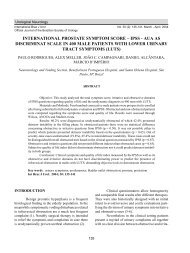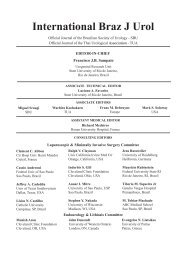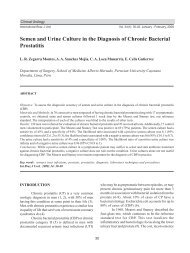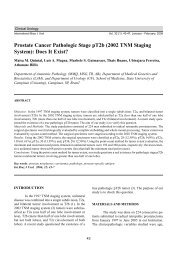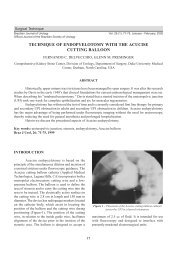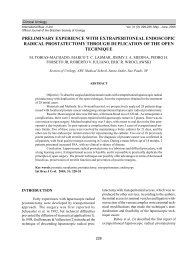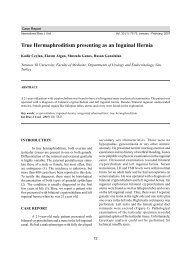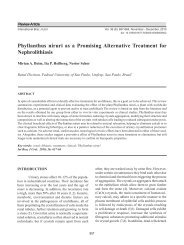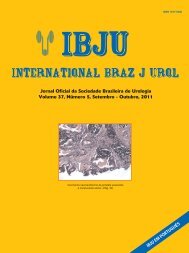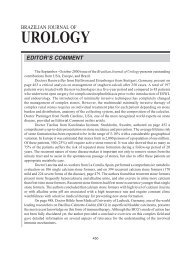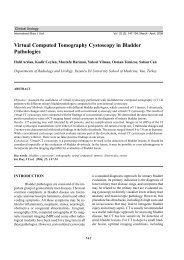committee on publication ethics (cope) - International Braz J Urol
committee on publication ethics (cope) - International Braz J Urol
committee on publication ethics (cope) - International Braz J Urol
Create successful ePaper yourself
Turn your PDF publications into a flip-book with our unique Google optimized e-Paper software.
importance, originality, and clarity, and the study’s<br />
relevance to the remit of the journal.<br />
2. Studies that challenge previous work published in<br />
the journal should be given an especially sympathetic<br />
hearing.<br />
3. Studies reporting negative results should not be<br />
excluded.<br />
4. All original studies should be peer reviewed before<br />
publicati<strong>on</strong>, taking into full account possible<br />
bias due to related or c<strong>on</strong>flicting interests.<br />
5. Editors must treat all submitted papers as c<strong>on</strong>fidential.<br />
6. When a published paper is subsequently found to<br />
c<strong>on</strong>tain major flaws, editors must accept resp<strong>on</strong>sibility<br />
for correcting the record prominently and<br />
promptly.<br />
IX - MEDIA RELATIONS<br />
Definiti<strong>on</strong><br />
Medical research findings are of increasing<br />
interest to the print and broadcast media.<br />
Journalists may attend scientific meetings, at<br />
which preliminary research findings are presented,<br />
leading to their premature publicati<strong>on</strong> in the mass<br />
media.<br />
Acti<strong>on</strong><br />
1. Authors approached by the media should give as<br />
balanced an account of their work as possible,<br />
ensuring that they point out where evidence ends<br />
and speculati<strong>on</strong>s begins.<br />
2. Simultaneous publicati<strong>on</strong> in the mass media and a<br />
peer reviewed journal is advised, as this usually<br />
means that enough evidence and data have been<br />
provided to satisfy informed and critical readers.<br />
3. Where this is not possible, authors should help<br />
journalists to produce accurate reports, but refrain<br />
form supplying additi<strong>on</strong>al data.<br />
4. All efforts should be made to ensure that patients<br />
who have helped with the research should be informed<br />
of the results by the authors before the mass<br />
media, especially if there are clinical implicati<strong>on</strong>s.<br />
5. Authors should be advised by the organizers if<br />
journalists are to attend scientific meetings.<br />
6. It may be helpful to authors to be advised of any<br />
media policies operated by the journal in which<br />
their work is to be published.<br />
X - ADVERTISING<br />
Definiti<strong>on</strong><br />
Many scientific journals and meetings derive<br />
significant income form advertising.<br />
Reprints may also be lucrative.<br />
Acti<strong>on</strong><br />
1. Editorial decisi<strong>on</strong>s must not be influenced by advertising<br />
revenue or reprint potential: editorial and advertising<br />
administrati<strong>on</strong> must be clearly separated.<br />
2. Advertisements that mislead must be refused, and<br />
editors must be willing to publish criticisms, according<br />
to the same criteria used for material in<br />
the rest of the journal.<br />
3. Reprints should be published as they appear in the<br />
journal unless a correcti<strong>on</strong> is to be added.<br />
Dealing with misc<strong>on</strong>duct<br />
1 Principles<br />
1. The general principle c<strong>on</strong>firming misc<strong>on</strong>duct is intenti<strong>on</strong><br />
to cause others to regard as true that which is<br />
not true.<br />
2. The examinati<strong>on</strong> of misc<strong>on</strong>duct must therefore<br />
focus, not <strong>on</strong>ly <strong>on</strong> the particular act or omissi<strong>on</strong>,<br />
but also <strong>on</strong> the intenti<strong>on</strong> of the researcher, author,<br />
editor, reviewer or publisher involved.<br />
3. Decepti<strong>on</strong> may be by intenti<strong>on</strong>, by reckless disregard<br />
of possible c<strong>on</strong>sequences, or by negligence.<br />
It is implicit, therefore, that ‘best practice’ requires<br />
complete h<strong>on</strong>esty, with full disclosure.<br />
4. Codes of practice may raise awareness, but can<br />
never be exhaustive.<br />
2 Investigating misc<strong>on</strong>duct<br />
1. Editors should not simply reject papers that raise<br />
questi<strong>on</strong>s of misc<strong>on</strong>duct. They are ethically<br />
obliged to pursue the case. However, knowing how<br />
to investigate and resp<strong>on</strong>d to possible cases of<br />
misc<strong>on</strong>duct is difficult.<br />
7



